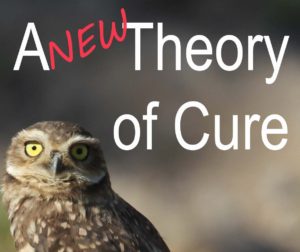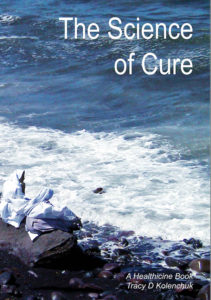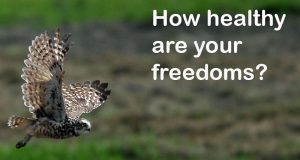 Are our freedoms healthy? In healthicine, we say “Everyone has a right to life, liberty and the pursuit of healthiness” because healthiness includes all freedoms and more, and is therefore superior to freedoms. We often think of freedoms with the phrase “life and liberty”, but there is much more to freedom.
Are our freedoms healthy? In healthicine, we say “Everyone has a right to life, liberty and the pursuit of healthiness” because healthiness includes all freedoms and more, and is therefore superior to freedoms. We often think of freedoms with the phrase “life and liberty”, but there is much more to freedom.
Freedoms begin with the body, rise into our mind, encourage our spirits, and are liberated and constrained by our communities.
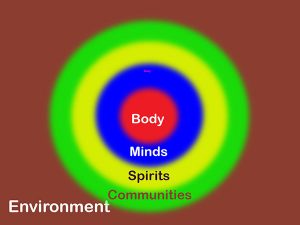 We can look at life, at each life entity, as a hierarchy rising from body, to mind, to spirits, to communities, each existing in their environments. What about freedoms? Let’s begin at the beginning, the body.
We can look at life, at each life entity, as a hierarchy rising from body, to mind, to spirits, to communities, each existing in their environments. What about freedoms? Let’s begin at the beginning, the body.
Our bodies have freedom to move. When we are young, we don’t often think about it. But, I’ll never forget the time I took an elderly friend to a clinic, and the first question the nurse asked was “can you clip your own toenails?”. “No.”, he replied, “not for many years.”
It never occurred to me that someday I might lose the freedom of movement to cut my own toenails. But there it is. I should live so long. Our bodies have physical freedoms. Is it healthy to have ‘more’ physical freedoms? I’m not sure, but I know it’s healthier to be able to clip your own toenails, even if you choose have someone else do it for you.
What types of freedoms does the body have? The body has freedom to move, freedom to stop moving, to rest, and even freedoms to change itself – to cut it’s own toenails, if necessary. In summary, the body has freedom to change.
The mind has different freedoms. Don’t think of the mind as the brain. The brain is part of the body. The mind consists of the processes, conscious and unconscious, that happen in the brain components including sensory organs and nervous systems. The mind can make decisions. Not only that, the mind can make decisions, and stick to those decisions, or change them. It is free to remember what it decided, or to change what was decided. The mind can learn, but not only that. The mind can choose to teach itself, or to neglect what it has learned – consciously or unconsciously. Likes and dislikes are learned, and as a result, the mind has freedom to change what it likes, what it doesn’t like; what it likes to do and what it doesn’t like to do; what it wants to do, what it doesn’t want to do.
A healthy mind has freedom to choose. Freedom to choose to change what has been chosen, to choose again – the same or differently.
Our spirits have other freedoms. Perhaps a moment to define what I mean by the spirits. Minds and spirits evolved together, so closely that it is almost impossible to state with certainty which came first. There is no doubt that even the smallest animal has a mind, and also has spirits. Senses provide input from the outside world and also the internal states. The mind remembers, forgets, and calculates. Working with the spirits, it decides. What do the spirits provide that the mind does not? Fear. Anticipation. Joy. These higher level emotions are not logical, cannot be calculated by the mind. They are not directly connected to our senses, they emerge from the complexity of sensory components. If they can be calculated, they are simple facts – part of the mind, and there is little need for emotion. Why do we need emotions? To make better use of the past to facilitate our future. To anticipate danger, to anticipate and enjoy success. To feel excited, or bored – so that we move towards excitement and opportunity.
What freedoms do our spirits have? The freedom to change. If our spirits cannot change, then once we become depressed – we might stay depressed, even in the face of opportunity. Once we become happy, we might stay happy – even in the face of danger. Healthy spirits are always changing, feeling what is happening, what might happen, analyzing what has happened in the past. Unhealthy spirits are stuck. Healthy spirits have freedom to change.
When we normally think of freedoms – we might first think of community freedoms and constraints: parents, family, religion, the law, the government, corporations – are entities that restrict our freedoms. If we don’t behave, as judged by a community, we get put in our room, in purgatory, jail, or worse. It is important to understand that communities also enable our freedoms. Communities provide opportunities for cooperation, which creates many things and opportunities an individual could never create by themselves. Humans cannot live without the assistance and opportunities provided by communities. From paths to roadways to highways to jet flight paths. Created by communities, not by individuals. It is possible for an individual to create a path, even a small road, but it’s easier with a community – and with a community, it’s much more useful. Sharing is an important aspect of freedom. Communities have freedoms too. They have freedom to grow, to shrink, and freedom to change. Over the long term, families, labour unions, companies and corporations, religions and governments grow and change. Communities have freedom to change. When a community loses freedom to change, it becomes weaker, less healthy.
“The spirit is willing, but the flesh is weak“, a common phrase about the differences between the freedoms of the spirit and those of the body. Maybe the body is tired. Maybe the mind is convinced that there is no time, or no logic to the action. Sometimes, it’s actually “the spirit is willing, but the mind is weak”. In other situations, when the spirit is willing, the mind can overrule the body’s complaints. Freedoms, even individual freedoms are not simple, not trivial – are often in conflict. That’s the way of health, the way of life.
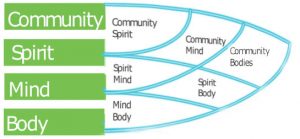 When we look analyze in more detail at the relationships between body, mind, spirits and communities, we might see something like this. In this diagram we can see that mind/body (or body/mind) and spirit/mind, and community spirit are also important considerations. Body and mind compete and cooperate. Spirit and mind compete and cooperate with each other creating spirit-mind, or mind-spirit. Communities and individuals compete and cooperate. This is how freedom works. Not by absolute rights and absolute wrongs, not by complete freedom of individuals, not complete freedom of mind, nor of spirit, nor of communities. The freedom to compete for attention, to compete with other layers, and also freedom to cooperate with other layers are essential to freedom. We need freedom to make better choices in complex situations.
When we look analyze in more detail at the relationships between body, mind, spirits and communities, we might see something like this. In this diagram we can see that mind/body (or body/mind) and spirit/mind, and community spirit are also important considerations. Body and mind compete and cooperate. Spirit and mind compete and cooperate with each other creating spirit-mind, or mind-spirit. Communities and individuals compete and cooperate. This is how freedom works. Not by absolute rights and absolute wrongs, not by complete freedom of individuals, not complete freedom of mind, nor of spirit, nor of communities. The freedom to compete for attention, to compete with other layers, and also freedom to cooperate with other layers are essential to freedom. We need freedom to make better choices in complex situations.
Freedom is not about actions, not about thought. It is about choosing.
But for every individuals, choosing freely is not so simple. Choosing freely is simply not possible, unless we identify which layer is choosing, and I suspect, if we look closer, we will find more layers of wants, needs, goals, and objectives, of choices. Our bodies are, after all, communities of cells, which compete and cooperate freely to create communities of tissues, which compete and cooperate freely to create communities of organs and limbs, which compete and cooperate freely to create organ and limb systems, which compete and cooperate freely to create and maintain our body. Mind, spirits, and communities simply extend the cooperation, and the competition; the freedoms that bring life and health. Freedoms do not exist without constraints. Freedoms do not exist without the need to decide which freedom to choose, consciously or unconsciously.
Are our freedoms healthy? Which freedoms are healthier? Which are less healthy? Freedoms that serve one area, be it body, mind, spirits, or community, but detract from the other areas, are less healthy. Freedoms that function in or assist more than one area are healthier. Freedoms that limit freedoms, like community laws against individual or community actions -risk decreasing healthiness. Freedoms that enable other freedoms are healthier.
Absolute freedoms are not true freedoms, not truly healthy, they are the freedoms that do not change, freedoms that are sickly, that lead to sickness in other areas.
The healthiest freedoms are freedoms that facilitate positive changes, that facilitate more freedoms.
to your health, tracy

